Beyond Winning
How To Build a Winning Identity
That Is Not Attached To Your Results

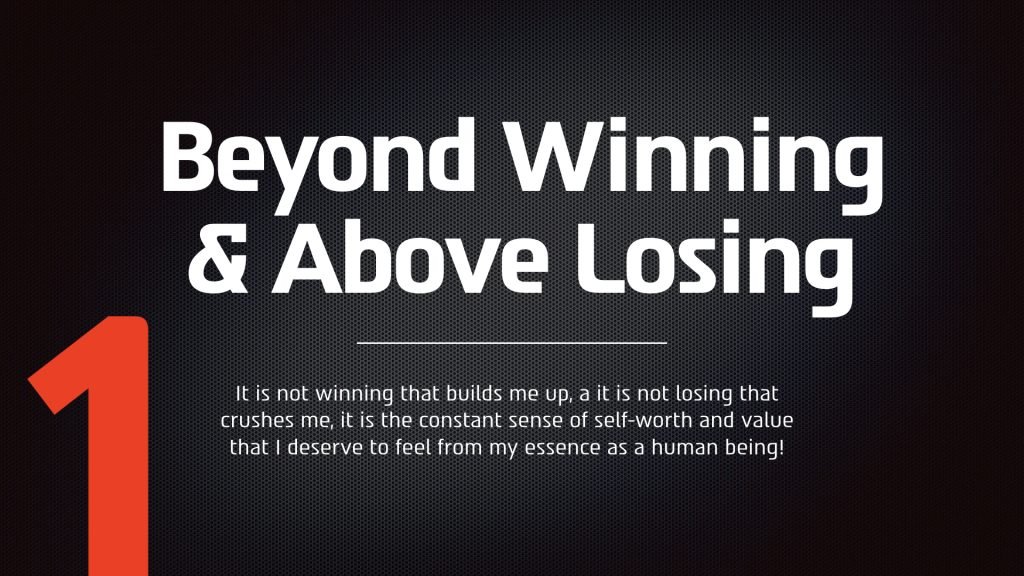
Beyond winning, above losing is my perception of life, a mindset in which it is not winning that builds me up, and it is not losing that crushes me, it is the constant sense of self-worth and value that I deserve to feel from my essence as a human being!
It is a consciousness in which we live our day-to-day lives on a level higher than our limitations and the definition of “who I am” and “who I am not.” It is a consciousness that contains no I won or I lost, it is a consciousness in which we are fully present in our mental strengths regardless of our material achievements.
On this level of consciousness? We do not need the result—winning—to feel worthy to live life. On this level of consciousness, we experience full separation between the person we are and the results we thought defined us as successful human beings.
It is important to understand
Our brain cannot grasp our existential value without the result
For our ego, a single thing defines our existential worth—the result
And unfortunately, no teacher ever taught us this…
There was no teacher who explained that even when I failed a test, I was still a rare, special person.
Nor did I have a coach who told me that even when I win in football, I do not become a person worthier of life.
Being beyond winning and above losing is a concept that reminds us that we have the natural right to feel complete and worthy just the way we are, without the results that the world sets for us.
And here is one thing that’s important to remember before you begin your day:
You are more than you’ll ever perceive
whether you’re defined as geniuses in your fields
or whether you’re “like everyone else.”
And as such
if you’ve been told that you’ll be successful
or if to this day you’ve been told that nothing will come of you
then this motto is intended to remind you of one thing:
You are more than anything that you’ll ever perceive that you are!
Don’t get me wrong, it’s not that you don’t have to fulfill your dreams, nor do I mean that you don’t have to move toward attaining things that are important to you—on the contrary—I want you to dream big, set ambitious goals and achieve them—go for it!
But what is important is that your starting point on the path to achieving those ambitious goals of yours in life is that you are great even without the result. What is more, you are great before the goal is even achieved.
You are great with or without your history.
You are great even without your academic degree.
You are great without your successes and the prizes you’ve won in life.
You’re great even without your name.
You’re great without money.
You’re great without your state-of-the-art smartphone.
You’re also great without your sunglasses.
You’re great without your wireless headphones.
You’re great without your salary.
You’re great without friends.
You’re great without your car and apartment.
You’re great without your beautiful clothes.
You’re even great without all of that!
And that is the basis of the mindset of champions.
To feel wholeness within the disadvantage.
Because champions think of themselves as champions—even before they are champions.
(We’ll get to that point in the following chapters.)
True happiness is not found in victories, and true pain is not found in failures, they are irrelevant. What is important is our ability to develop an identity that is unrelated to results, to feel great and to burst with confidence even without the result we want.
Champions achieve a state of mind in which the result is not what determines their self-worth, it is the knowledge that they have no disadvantages even when they don’t achieve the result; that they will always have someone to lean on, even if they stumble on the way to the result—they will always have themselves!
This enables us to function with ease when others are stressed out.
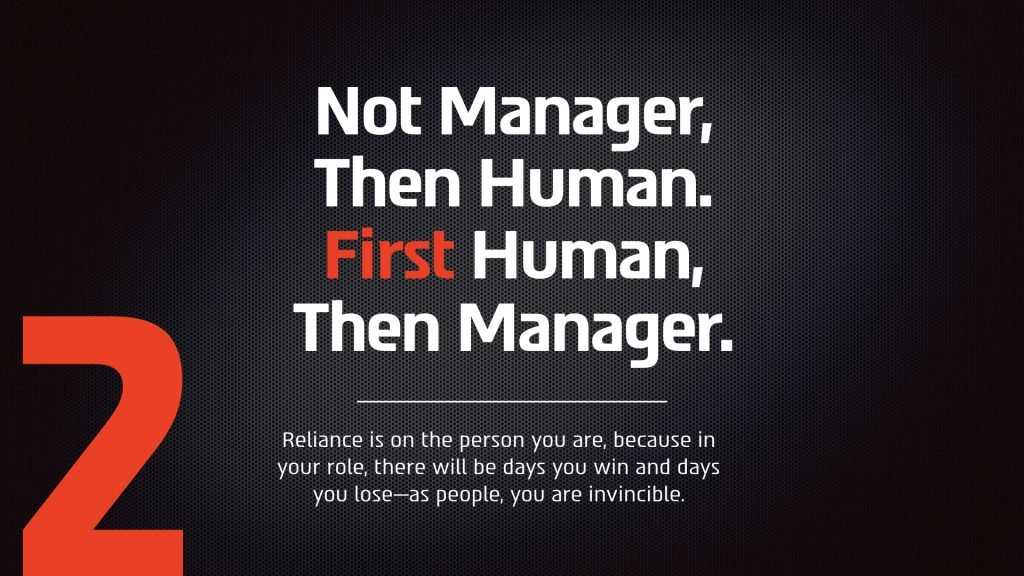
In order to live healthier lives in our race for results, we need to build the identity of winners for ourselves, regardless of the results. We need to learn to separate “the person that we are” from our central role in life and begin to value ourselves unconditionally as human beings, regardless of the results.
In sports: We need to know how to separate the person that we are—from the athlete that we are. That is, we are not athletes who are also human beings, we are amazing people who are apparently really good athletes too.
In business: You want to separate the person that you are—from the business person that you are. In other words, you aren’t business people who are human beings, you are amazing human beings that also do business.
This is a state of differentiation, in which we create a distinction between the person that we are, who is good by nature, and our role, which will naturally run into days of victories and days of losses.
The idea here is that you are much more than footballers, athletes, business people, coaches, parents. You are primarily people who are loved and appreciated unconditionally, and unrelated to your results—and that is the basis to lean on.
Reliance is on the person, because in your role, there will be days you win and days you lose—as people, you are invincible.
Which leads us to the principle:

Give 100% of yourself to your role, but don’t let your role be 100% of you
This principle says that I’ll give 100% of myself in every situation to the success of my role, but either way—whether I win or lose—the result will not define me, because I will always be at peace with myself when I’ve given 100% of myself. Winning not in the result, it is in being at peace with ourselves even when the result is not in our favor.
In other words, in order to succeed in a competitive world, it is extremely important to separate our self-esteem as human beings from our self-esteem in our central roles in life (manager, athlete, business person). Only when we separate things does our performance improve, because deep inside we know that even if we fail, we’ll return home with our self-image as people still strong.
As such, leading up to each of your missions, you continue to strive to win in each mission.
“In the moment before”—I’m going in in order to win!
“In the moment after”—whether I win or lose—I know that I am loved and worthy of life, regardless of the outcome.
Key Phrase
“Today I will give 100% of myself to achieving my goal in life, and at the end of the day—whether I win or lose—the outcome will not define me, because I will always be at peace with myself when I gave 100% of myself.
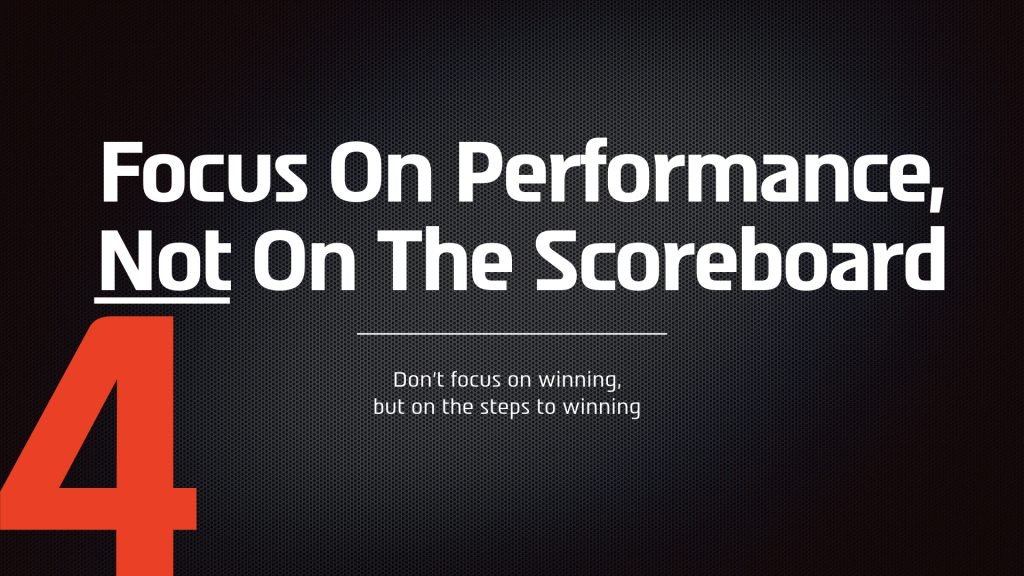
When you start your workday, your goal is in the future, and it is only a day away.
When you set yourself goals in a game, there are two kinds of goals that you want to identify:
- Result-based goals
- Performance-based goals
I’ll explain…
Result-based goals are your biggest goals. They are what you wish to achieve big time at the end of the game—that’s the big picture.
Examples of result-based goals:
- Meet targets
- Bring in a big client
- Get that promotion
- Be a big fish in the organization
- Establish your status
As you can see, these goals are related to the final outcome, and these are the goals that even when you’re at your peak, you cannot always guarantee will happen exactly as you planned.
On the other hand, performance-based goals are specific goals related to professional and mental actions that are within your control (you can perform them ten out of ten times with your eyes closed).
Examples of execution-based goals:
- Make sure to get into bed at 11 p.m. so that I can get seven hours of sleep and wake up alert
- Call five potential customers
- Encourage myself at moments of difficulty for me
- Accept that I am human and I will make mistakes during the day
- Eat small meals during the day rather than junk food
- Have a staff meeting and empower each employee publicly for a goal they achieved that month
- Make a dinner date with my wife or husband (and book the babysitter)
- Set up two running training sessions on Mondays and Thursdays with my coach
Are you beginning to understand the difference?
A result-based goal is the end goal that I wish to achieve, whereas performance-based goals are the way to achieve the result-based goal.
If I want to drink coffee, then my result-based goal is to drink coffee. My performance-based goals include boiling the water, putting a teaspoon of coffee in a cup, adding a teaspoon of sugar, a little milk, and stirring.
*Where do many people make mistakes?*
Most problems begin when people begin their day with a result-based goal (winning) and not with a performance-based goal (the steps to winning). They focus on winning and not on the steps to winning (by the way, your self-confidence is in the steps, not in the results.)
You see, your brain is like a six-year-old kid who needs clear and detailed instructions on “what to do” and so my suggestion to you is to set yourself performance-based goals at the beginning of the day.

A nice and quick way to do this is to take a small, square note the night before and draw a line down the middle. On the right-hand side write “Result” and on the left-hand side write “Performance.” Then fill the columns out according to your role.
*Result (final goal)*
*Performance (steps)*
For example: If I’m a manager and the result I want is for my team to meet a daily sales target of 100 sales, then on the right I’ll write “100 sales.” On the left, I’ll list specific performance goals that will increase my odds as a manager to achieve my goal. For instance:
- I’m nearby my salespeople and assist them in real time during sales pitches.
- I encourage them to make mistakes and learn from every mistake.
- I encourage myself throughout the day and remind myself that the more I support them during moments of stress, so their fortitude and peace of mind will grow, and so will the sales.
- I remember to value them for their effort, not only for results.
- I initiate planned breaks and take the team out for revitalizing breaks.
* What is your winning objectives note?*
If you feel like it, then play with the idea and you’ll be surprised at how much peace and order of mind it creates.
My suggestion to you is:
- Take a sheet of paper and list your goals.
- List result-based goals—list whatever you feel like, without limit.
- List your performance-based goals—and here? Don’t go on and on, keep performance-based goals simple. I suggest two, three professional goals and two, three mental goals tops.
Despite the simplicity of this tool, you’ll be surprised to discover how quickly the words you’ve written on the page will become a reality on the field.
Success is not the result—it is the journey to your destination
The championship is not only the trophy, it is also the journey to the trophy against all odds
It was Kobe Bryant who said in his retirement interview:
“Those times when you get up early and you work hard; those times when you stay up late and you work hard; those times when don’t feel like working — you’re too tired, you don’t want to push yourself — but you do it anyway. That is actually the dream. That’s the dream.”
He went on to say…
“It’s not the destination, it’s the journey. And if you guys can understand that, what you’ll see happen is that you won’t accomplish your dreams, your dreams won’t come true, something greater will. And if you guys can understand that, then I’m doing my job as a father.”
Kobe understood that sometimes our dreams are smaller than the true potential that lies within us, and when we focus on our daily performance (and not on the final outcome) we’ll be surprised to discover that we may very well achieve something bigger than the goals we set ourselves at the beginning.
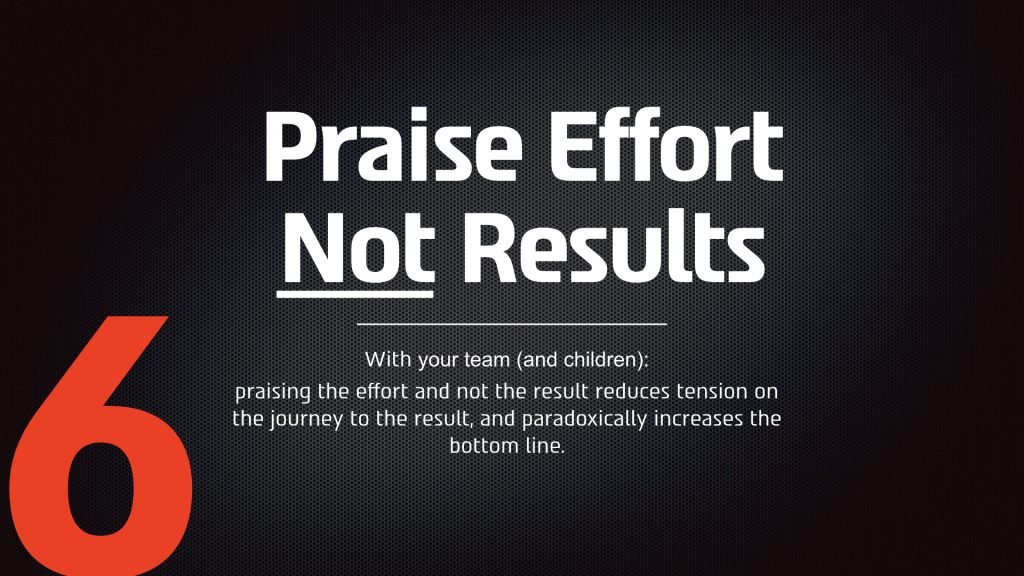
Praise effort and not results—to increase successes
Carol S. Dweck, in her book Mindset, tells us of an experiment that she conducted, examining the effect of praise for effort versus praise for results, and how it affects motivation to perform difficult tasks.
The experiment was very simple. Two groups of children were given a fairly easy puzzle to solve. After completing the easy puzzle, the two groups received very different compliments:
Every child in the first group was given the compliment: “You’re so smart, well done.” The children in the second group were given the following compliment: “You must have put in a great deal of effort, well done.” Then they asked the children if they’d like to perform another puzzle— easier or harder—and allowed them to choose.
Which children chose which task?
Of the group that received a compliment on their intelligence, the vast majority chose the easier task.
Of the group that received a compliment on their effort, the vast majority chose the difficult task.
A single compliment affected their choice in a decisive way.
How does this relate to your success today?
Praise and appreciation for effort contains a recipe for success.
If I receive praise for my effort, I know what to continue doing: When I succeed—I continue to make an effort and develop. When I fail—I continue to make an effort and develop. There is no big difference between the two situations, and the significance of success or failure is not that great.
Praise for results contains only judgment. Good or bad. And there is nothing I can do with that but to rejoice in my success for a little while (because in no time I’ll have to prove myself again), and to be very afraid, to despair—at times of failure.
How do we develop mental fortitude in children or employees?
When I tell a child, “You’re smart,” the only thing left for them to do is to protect that perception of “I’m smart” and to do everything not to destroy it, so if the test is too difficult, they prefer not to take it.
On the other hand, when you say, “You know how to work hard and make an effort,” it doesn’t matter to the child if they succeed or fail, they want to prove their effort.
In other words, saying “You’re a genius” or “You’re an idiot” is not all that different. “You’re a genius” is the other side of the destructive coin, “You’re an idiot.” Because if people tell me that I’m smart, then when they tell me I’m smart, I immediately understand (I am pretty smart) that I’m stupid.
When you say to a child, “You’re a genius,” the only thing that child can then do is to protect their image as a genius. And then who arrives? The ego, who doesn’t want to lose the title, Our Little Genius. Hesitancy creeps into the game, fear takes over and mistakes begin to happen.
So at the end of the day, your goal is to look at and evaluate the effort you’ve made along the way to your daily results and goals. It is not to look at the results. With our children too, praising effort and not results reduces tension on the journey to results, and paradoxically increases the bottom line.
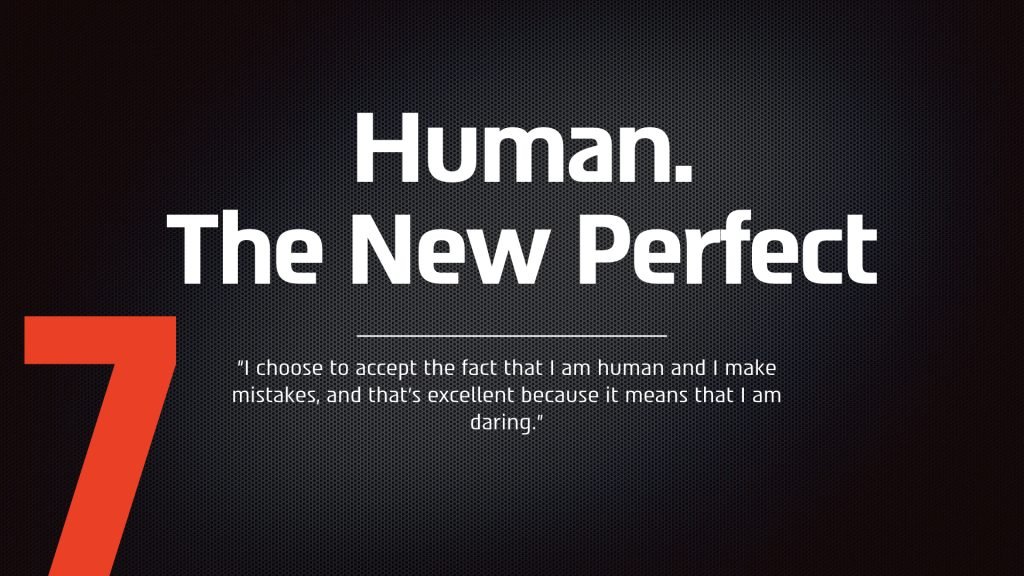
Look, it turns out that there are two approaches to living the race for success
- The *Perfectionist* approach
- The *Optimalist* approach
The *perfectionist* is the footballer with standards way beyond his or her reach. Perfectionists set impossible goals and measure their self-worth as a person only in terms of achievement. “I won so I rule—I lost, so I’m nothing,” and there is nothing in the middle.
The perception of the perfectionist footballer is based on thinking that it’s all or nothing: “Everything must be perfect, just as I expect of myself. Every pass, every move. And any result that’s less than perfect? Equals failure.” So where do the problems begin? They all begin from this all-or-nothing mindset that makes the perfectionist interpret every error, lost ball, obstacle, lost game, disruption, or unexpected change in plans or in their expectations as a disaster, and as an attack on their self-worth. The perfectionist—as you must have understood by now—refuses to come to terms with failure, refuses to accept painful feelings, and it’s quite painful to say, but also refuses to accept their own successes. Yes, it sounds strange, but perfectionists don’t know how to celebrate successes, and it’s pretty obvious why, right? Because their lives are an endless race—when they finally succeed, they enjoy their achievement for a second and a half, and then? They immediately begin to worry about their next goal, the next game, and what may happen if they fail on the way to achieving it.
The perfectionist pays a very high emotional price for refusing to recognize reality. Because in reality, as in reality, the chance of failure always exists—but the perfectionist’s opposition to recognizing failure as possibility generates anxiety, stress, depression, low self-image, constant self-flagellation and an end to a day without the desired results.
In contrast, we have the *Optimalist.*
The optimalist also has ambitions and high standards. Optimalists also want to succeed in a big way, to be a loved partner, a proud parent, a friend and inspiring footballer, so in what way are they different from perfectionists? They are light-years away from the perfectionist approach to the process of achieving goals.
The difference lies in *their level of happiness on the way to achieving their goal.*
In other words, their path to their goals is different.
*The perfectionist suffers on the way to their destination* (and judges themselves for every little thing.)
*The optimalist flows all the way to their destination (and is more forgiving of mistakes).
The optimalist accepts the fact that in the world of competitive football, there is no way to avoid a certain degree of failure and sadness, and that success should always be measured according to attainable criteria.
*Why is this important?*
Because when we set practical goals for ourselves before a game, goals that are within our control and that can be performed during the game, we experience success by meeting our goals. And at the same time, when we come to terms with the fact that failure, loss, painful feelings are all part of the game—then our lives are not an emotional rollercoaster.
*Are you beginning to understand why the optimalist lives well?*
The optimalist does not deny reality—optimalists look reality in the eye and adapt themselves to it with love and creativity.
By the way, you may find this interesting, the word “optimalist” does not come from the word “optimistic” but from the word “optimal,” or in Latin, optimus, which means “most favorable or advantageous”—not “perfect.” The best possible for me under the circumstances.
Your goal today is to live your journey to success from within the optimalist’s lens. Not to deny reality—but to accept it and begin to make the best of it in pursuit of your ambitious goals.
Winning mottos for you to choose from:
“I undertake to strive for perfection during training, but I accept that I cannot always be perfect when performing.”
“I choose to accept the fact that I am human and I make mistakes, and that’s excellent because it means that I am daring.”
“I choose to focus on my professional goals instead of on the scoreboard or on what others think.”
“I choose to be the best I can today, according to the circumstances.”
“Human—that’s the new perfect.”
Bonus Motto: “The field is limited, but you—are infinite!
John Wooden, the legendary basketball coach, did well when he defined success as follows:
“Success is peace of mind which is a direct result of self-satisfaction in knowing you made the effort to become the best of which you are capable."
So from here, I would like to appeal to you personally.
The Field Is Limited,
But You—Are Infinite!
Personal note
from Eitan...
When you chose to be accomplished people, you took into account—whether consciously or not—that the field of life will confront you with victories and losses; that the significance that you have chosen to award loss defines you, and that’s exactly where the problem begins.
When to you, the meaning of loss is “I’m a loser,” then you’re absolutely right! Because belief always wins!
When you choose to give winning the meaning “I rule” then here, too, you are absolutely right.
The problem begins and ends with the significance and value that you gave to winning and losing. When the result is the leading value in your lives, you will always be captives of circumstances and live your lives as slaves of the game, the press, the crowd, the family, and mainly—yourselves.
Life teaches us the most precious lesson of all: Self-knowledge is determined not by the outcome but by the path we take.
Only you dictate your rules of the game, and what you dictate will exist in your world.
Today you already know that we have no control over any outcome in the field of life. Even when you think that you’ve won only because you worked hard, it is only an illusion, on the other side there are people who worked hard and you still surpassed them, and vice versa.
The lesson we have here to learn is who we are, regardless of the outcome.
It is to recognize the strength we have within us and to enjoy the path.
Life is not black and white, it exists in the spaces between.
You have control over one thing, and that is the way in which you choose to be there.
Being king or queen is in awareness, not in the result!
Worthlessness is in consciousness, not in the result!
The real purpose of life is to awaken you to seeing and facing the parts in you that you have not yet been exposed to, with inner faith in yourselves—regardless of the game, with determination, perseverance, and a flexible mind.
Remember, the field is limited but you—are infinite!
Your game time is limited, in an instant reality can change its form, and you’ll be out of the game, but the lesson of self-worth and self-image no one can take away from you, and that is the only choice you have!
Ask yourselves every morning: Who do you want to be in this world?
The king or queen for minutes of glory that define you?
Or a leader who chooses to outdo yourself at any given moment.
With love,
Eitan

PS – feel free to contact me at eitanaz2@gmail.com